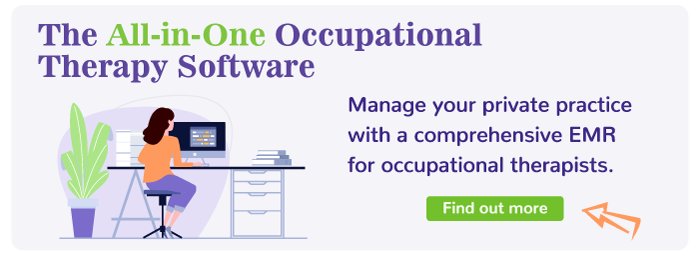Bayley Scales of Infant Development

The Bayley Scales of Infant and Toddler Development, fourth edition, is a developmental assessment used for evaluating developmental delays in early childhood, from ages 16 days to 42 months. BSID is the abbreviation for this assessment, with the 4 indicating the fourth edition published in 2019. Scores are norm-referenced and can be administered in person using paper administration booklets or by using a web-based administration on Pearson’s Q global platform. Average administration time requires 30-70 minutes to complete.
What are the 5 components of the Bayley Scales of Infant Development?
Occupational therapists use this assessment commonly in outpatient clinics and Early Intervention settings, working primarily with children experiencing a developmental delay. The Bayley Scales of Infant Development 4 measures skills within five domains including, cognition, language, motor skills, social emotional and adaptive behavior skills. This assessment is routinely updated to remain sensitive and reliable for identifying developmental delay in early childhood.
There are five domains included in the Bayley Scales of Infant Development 4 that help identify exact developmental areas of strength and learning needs that a child demonstrates in daily participation.
- Cognitive Scale: Visual preference, memory, attention, sensorimotor, exploration, manipulation, and content formation.
- Language Scale: Including receptive and expressive subdomains.
- Motor Scale: Fine motor and gross motor skills
- Social Emotional: Self-regulation, communicating needs, using emotional signals.
- Adaptive Behavior: Listening, understanding, self-care, relating to others and playing.
Administration for the Bayley Scales of Infant Development 4
Clinicians can administer the Bayley Scales of Infant Development 4 using print materials, using Pearson’s web-based Q-Global program, and it can also be administered virtually. Clinicians can administer one or more domain subtests individually if needed and can take complementary training to introduce clinicians to using this assessment correctly.
Sections are divided into standardized administration of the cognitive, language, and motor scales using test items and a caregiver questionnaire for adaptive behavior and social-emotional skills. Guidance for structured observations within this assessment is included in the user manual for the correct scoring of clinical observation tasks.
Clinicians explain the test to caregivers and offer opportunities to discuss concerns before the administration to establish rapport and set an engaging tone for the evaluation. This test allows a caregiver to be present during the administration which may help build rapport with the child and caregiver as the assessment progresses.
Once the administration begins, caregivers are not supposed to assist the child in any way other than providing positional support, such as a child sitting in their parent’s lap. However, there are opportunities built into the assessment for the caregiver to provide additional information about the child to assist with scoring, such as when considering how often a child engages in symbolic play.
With practice and review of the user manual, this administration can move quickly with therapists able to gather information during repeated test items for time management. Scoring of the Bayley Scales of Infant Development 4 is polytomous for each item, with two indicating mastery, one indicating a skill is emerging, and zero indicating not present. Scoring can happen automatically using web-based administration or manually converting raw scores into standardized scores, age equivalents, and percentiles.
Using Bayley Scales of Infant Development 4 Results for treatment planning
The Bayley Scales of Infant Development 4 is used to identify developmental delay and is often used in settings for early identification of developmental delay in efforts to provide early intervention services. The Bayley Scales of Infant Development 4 is a norm-referenced, standardized measure that, with proper administration, provides information about a child’s developmental profile compared to peers in the same age range. Scores can serve as a reliable outcome measure and to monitor progress over time. Information and scores from this assessment cover many skills in a child’s occupational roles, with scores offering individualized information to help customize a treatment plan, select appropriate interventions, and create goals to complement an individual child’s strengths.
Collaborating with caregivers and other professionals
Clinicians, psychologists, developmental pediatricians, neuropsychologists, occupational therapists, speech-language pathologists, and nurse practitioners are all qualified providers who can administer this assessment with appropriate training. The Bayley Scales of Infant Development 4 undergoes frequent reviews to update the information to retain clinical sensitivity and reliable applicability for transdisciplinary use to identify children who qualify for early intervention services.
Caregiver collaboration is crucial when working with early intervention services including the use of a coaching model to include caregivers has supported literature to promote positive outcomes for children in the zero-to-three-year age range. The Bayley Scales of Infant Development 4 also provides a well-rounded, dynamic profile of a child’s functional abilities with a wide variety of test items to gather information related to a child’s strengths and weaknesses.
Parents, caregivers, and educators can be provided with graphs to monitor ability level and progress, along with age equivalents to help explain scoring for each domain and clearly define the role occupational therapy has within a child’s treatment plan for an efficient multidisciplinary approach to supporting the success of each child.
Start 30-day Free Trial and explore TheraPlatform. HIPAA Compliant Video and Practice Management Software for Therapists.
Conclusion
The Bayley Scales of Infant Development 4 is a trusted assessment for early identification of developmental delay and assisting families when qualifying a child for early intervention services. With appropriate training, clinicians can master the administration of this assessment, offering valuable scoring to create effective treatment programs, support early identification and provide intervention for children with developmental delays.
Resources
Visit Theraplatform, an all-in-one EHR, practice management and teletherapy tool built for therapists for more information about occupational therapy assessments to help you manage your practice. Sign up for a free, 30-day trial with no credit card required. Cancel anytime.
More resources
- Therapy resources and worksheets
- Therapy private practice courses
- Ultimate teletherapy ebook
- The Ultimate Insurance Billing Guide for Therapists
- The Ultimate Guide to Starting a Private Therapy Practice




